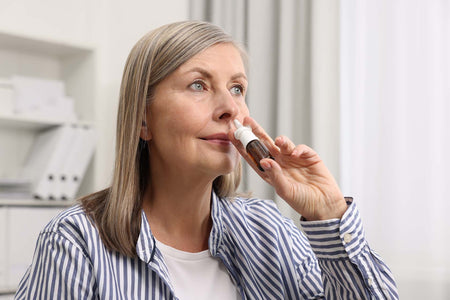- Allegra is best for daytime relief with minimal drowsiness; works for hay fever and hives.
- Benadryl is also effective for hay fever. Additionally, it offers nighttime relief and helps with skin irritation but causes drowsiness.
- Allermi is a customized nasal spray combining antihistamines, decongestants, anticholinergics, and an anti-inflammatory for fast and effective nasal allergy relief.
When allergy season strikes or unexpected allergens pop up, we often reach for medications to find relief. But which one should you choose? Both Allegra and Benadryl are trusted options for tackling allergy symptoms, yet the choice isn’t always straightforward.
Do you need something that lasts longer throughout the day, or are you looking for a medication that helps you sleep at night? Both medications can work to ease allergy symptoms, but their differences — such as duration, drowsiness, and specific use cases — can make all the difference depending on your needs.
This article will help you decide more on what works best.
Related: What to Do When Allergy Medicine Doesn't Work?
What is Allegra?
Allegra is a popular over-the-counter medication that contains fexofenadine, an antihistamine that reduces the effects of histamine — a chemical responsible for triggering allergic reactions.
This medication is especially helpful for individuals dealing with hay fever (allergic rhinitis) and relieves symptoms like sneezing, a runny nose, watery or itchy eyes, and throat or nasal irritation [*].
Unlike some other antihistamines, Allegra is marketed as a non-drowsy option, allowing users to manage their allergies without the sedative side effects that can interfere with daily activities.
Allegra comes in several formulations to accommodate different preferences and age groups. It is also available in gel caps, which feature a smooth, gel-coated design that makes them easy to swallow. For younger children, Allegra offers liquid and dissolvable tablets.
What is Benadryl?
Benadryl is also an antihistamine that is used to treat allergy symptoms caused by hay fever and other allergic reactions.
However, unlike Allegra, Benadryl contains diphenhydramine, a first-generation antihistamine that affects the brain and nervous system, which can cause drowsiness. Because of this, Benadryl is commonly used at night for allergy relief or as a sleep aid [*][*]. Other uses include relief from motion sickness and cold symptoms.
With its broad range of uses and formulations, Benadryl remains a go-to option for many who are looking for fast relief from allergies and related conditions.
Related: Zyrtec vs. Benadryl: Differences and Alternatives
Allegra vs. Benadryl
When choosing between Allegra and Benadryl, it’s important to understand how they differ in terms of effectiveness, side effects, and use cases. Here is a table that breaks down the key details to help you decide which medication suits your needs.
| Allegra | Benadryl | |
| Drug Class | Antihistamine(Second-generation) | Antihistamine (First-generation) |
| Generic Name | Fexofenadine | Diphenhydramine |
| Indications | It effectively relieves symptoms such as sneezing, a runny nose, itchy or watery eyes, and throat or nose itching due to seasonal allergic rhinitis (hay fever). Allegra is also used to treat long-term hives and the associated itching. | Commonly used to relieve symptoms associated with hay fever and other upper respiratory allergies. Benadryl is also effective in alleviating common cold symptoms, particularly sneezing and a runny nose. For motion sickness, Benadryl is often used for the prevention and treatment of nausea, vomiting, and dizziness caused by motion. It is also effective in treating insomnia, particularly when difficulty falling or staying asleep is related to temporary causes. In terms of skin irritations, Benadryl is commonly used in topical formulations to relieve itching and discomfort caused by insect bites, sunburn, and minor burns. |
| Side Effects | The side effects are generally mild. Commonly reported side effects include headache, dry mouth, nausea, fatigue, and dizziness. | Drowsiness, dizziness, dry mouth, blurred vision, constipation, and upset stomach are common. Other possible side effects include difficulty urinating (particularly in older adults), rapid heartbeat (rare but possible in sensitive individuals), and allergic reactions (rare). |
| Duration/Course | Its effects last up to 24 hours. | Taken every 4-6 hours |
| Onset | Typically begins working within 1-2 hours after the first dose. | Within 30 minutes. |
| Dosage | Based on your symptoms and medical history, your healthcare provider can advise the most suitable Allegra dosage. | Based on your symptoms and medical history, your healthcare provider can advise the most suitable Benadryl dosage. |
| Drug Interaction | Some frequently checked medications that may interact with Allegra include albuterol, amlodipine, aspirin, atorvastatin, Benadryl (diphenhydramine), famotidine, gabapentin, ibuprofen, levothyroxine, lisinopril, melatonin, montelukast, omeprazole, prednisone, and tramadol. Allegra should not be taken with fruit juices such as grapefruit, orange, or apple juice, as these can reduce its absorption and effectiveness. Antacids containing aluminum or magnesium can also interfere with the absorption of fexofenadine. | When taken with alcohol or other central nervous system (CNS) depressants (such as benzodiazepines, opioids, or sleep aids), it can enhance their sedative effects, which leads to increased drowsiness, dizziness, and even dangerous respiratory depression. Benadryl can also interact with certain medications, including monoamine oxidase inhibitors (MAOIs), which are a class of antidepressants. May cause a slight drop in blood pressure, which can amplify the effects of blood pressure-lowering medications. |
| Warnings/Precautions | Do not use this product if you have ever had an allergic reaction to it or any of its ingredients. While Allegra is a non-drowsy antihistamine, some individuals may still experience mild drowsiness or other side effects. It’s important to see how you respond to the medication before engaging in activities that require full alertness, such as driving. If you have kidney disease, it's important to speak with your doctor to determine if a dosage adjustment is necessary. Pregnant or breastfeeding individuals should consult a healthcare provider before using this medication. | You should not use any other product containing diphenhydramine, even if it is a topical medication for the skin, at the same time as Benadryl. People with glaucoma or trouble urinating due to an enlarged prostate gland should also consult a doctor, as Benadryl may exacerbate these conditions. Avoid alcohol because it can make you feel even sleepier. Taking Benadryl with sedatives or tranquilizers can also increase drowsiness, which makes it harder to focus or coordinate. Because of this, you should be extra cautious when driving or using machinery while taking this medicine. |
What’s the Best Alternative to Allegra and Benadryl?
When looking for an alternative to Allegra and Benadryl, it’s important to consider options that can meet your specific needs and preferences.
Unlike traditional antihistamines that offer a standard approach to nasal allergy relief, Allermi combines multiple active ingredients. These include an antihistamine, micro-dosed decongestant, anti-discharge, and anti-inflammatory.
Allermi offers a fast onset of relief, with many individuals experiencing noticeable improvements in symptoms within just 10-15 minutes of use. You can use Allermi whenever you need it, especially during allergy seasons. Use it twice a day for a few weeks or months to manage your environmental allergy symptoms. Once the season ends, you can stop and start again when needed.
Want to learn more about Allermi? Check out our FAQs for details on ingredients, how it works, and everything you need to know to get started.
Related: How Long Does It Take for Allergy Medicine to Work?
The Bottom Line
Allegra offers long-lasting, non-drowsy relief ideal for daytime use, while Benadryl provides fast-acting relief but often causes drowsiness. Both medications have their benefits, but your choice should align with your specific needs, side effect tolerance, and lifestyle.
On the other hand, the Allermi nasal spray is personalized to treat different aspects of nasal allergies, which gives you quick relief and easy use for seasonal or year-round symptoms.
References:
- ScienceDirect. (n.d.). Fexofenadine. In Chemistry. Retrieved December 30, 2024, from https://www.sciencedirect.com/topics/chemistry/fexofenadine
- ScienceDirect. (n.d.). Antihistamines. In Neuroscience. Retrieved December 30, 2024, from https://www.sciencedirect.com/topics/neuroscience/antihistamines
- Your guide to nonprescription sleep aids. (n.d.). Mayo Clinic. https://www.mayoclinic.org/healthy-lifestyle/adult-health/in-depth/sleep-aids/art-20047860










